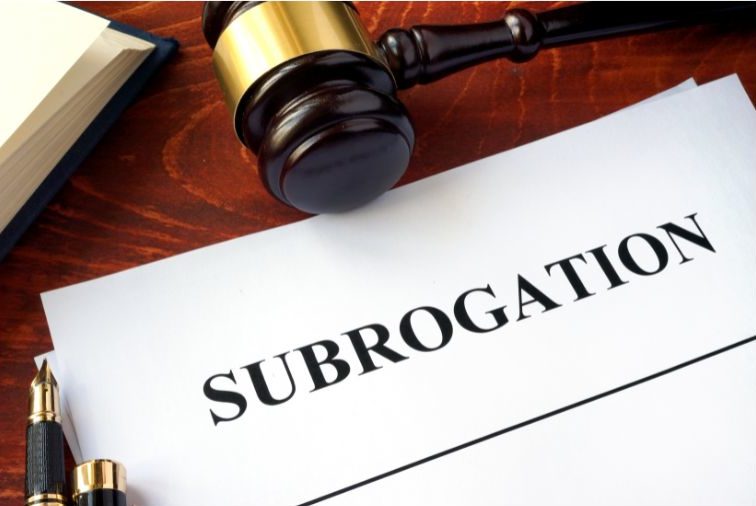What is Subrogation in Insurance?

Subrogation, often shortened to subro, is the right of your insurance company to request reimbursement from the liable party after they’ve covered your claim. Usually, that reimbursement comes from the at-fault party’s insurance company.
After your insurance company’s subrogation claim is approved, those proceeds can help cover the cost of your deductible. These costs are usually included in your total settlement amount. Plus, here in Louisiana, the civil law system can mean that subrogation happens a little differently here than in other states.
Just what is subrogation? How does it apply in your case? And why might your insurance company get a portion of your settlement? These questions and more are answered in this blog!
Just What Is Subrogation?
In plain English, subrogation is just a legal word for substitution. One party subrogates another’s legal right to collect debt or damages when they enforce another’s right for their own benefit.
Insurance companies frequently subrogate their clients’ claims by paying their clients’ damages on the front end, then recouping those damages from the other party after the case has been settled. An example might make this clearer:
- John rear-ends Alice at a traffic light, causing her property damage and a whiplash injury.
- Alice files a claim with her insurance.
- Her insurance approves her claim and pays her for car repairs and doctor’s visits to repair her injury. At this point, her insurance is out that money.
- To recoup their losses, Alice’s insurance subrogates her claim, meaning they now pursue the damages from the other party on her behalf.
- What happens next depends on John’s insurance:
- If he has insurance that can cover Alice’s losses, her insurance and his will usually work things out between the two of them, and the matter is settled.
- If John doesn’t have insurance, however, then Alice’s insurance will probably attempt to recoup their losses from John himself. This can also happen if John’s insurance doesn’t cover the full cost of Alice’s losses.
While everything that happens after subrogation can be complicated, the actual process of subrogation is simple. When your insurance pays to help you recover from your injuries, they subrogate your claim so that they can seek compensation themselves.
How Subrogation Might Apply in Your Case

Since Louisiana law is founded on French civil law as opposed to English common law (what the rest of the country uses), personal injury cases and subrogation work a little differently here than in other parts of the country. In general, Louisiana law is more supportive of subrogation actions than common law jurisdictions are, and Louisiana courts generally accept subrogation rights arising from settling third-party liability claims.
An example of the Louisiana courts being generally more supportive of subrogation actions can be found in Independent Fire Insurance Co. vs. Kline from 1984. In that case, the insured’s carport collapsed during high winds, which were covered under their policy. Their insurance provider paid them to cover their losses, then sued the contractor who built the carport for defects in its construction. While the contractor asserted that the insurer didn’t have subrogation rights because construction defects weren’t covered under the policy, the 3rd Circuit Court noted on appeal that the subrogation agreement assigned “all claims” to the insurer, which included construction defects. The case was allowed to go to trial.
In addition, third-party liability claims can also lead to subrogation. Louisiana generally permits a liability insurance carrier to subrogate against a third party after settling the plaintiff’s claims, which often comes up in personal injury or toxic tort cases. After you’ve been injured due to someone else’s negligence, your insurance company may include a subrogation clause in your final settlement offer.
Why Does the Insurance Company Get a Portion of My Settlement?
After winning your settlement, you may think your injury case is over—but that is far from the truth. The amount of your settlement will still need to be divided up between yourself, your outstanding debts, your attorney’s fees, and various court fees. If your insurance company was unable to recover its losses from a subrogation action, they may try to get in on the take as well.
That’s why you need an experienced Louisiana subrogation lawyer to fight for your rights against your insurance company. Before signing a settlement agreement, have an attorney from Gordon McKernan Injury Attorneys look it over to make sure the subrogation clause doesn’t include any sneaky grabs for your money. We can also help in the case that insurance does try to come after you after your settlement is done!
Get Gordon and Get Insurance off Your Back

If you’ve been injured because of someone else’s negligence, the last thing you should have to worry about is your insurance asking for money you don’t have. Gordon McKernan Injury Attorneys are experienced Louisiana personal injury lawyers who’ve seen it all and lived to tell about it—and we can help your case too.
Give one of our dedicated attorneys a call today at 888.501.7888 for a free consultation about your case. We’ll listen to your story, provide legal advice, and get started working on your claim right away.

